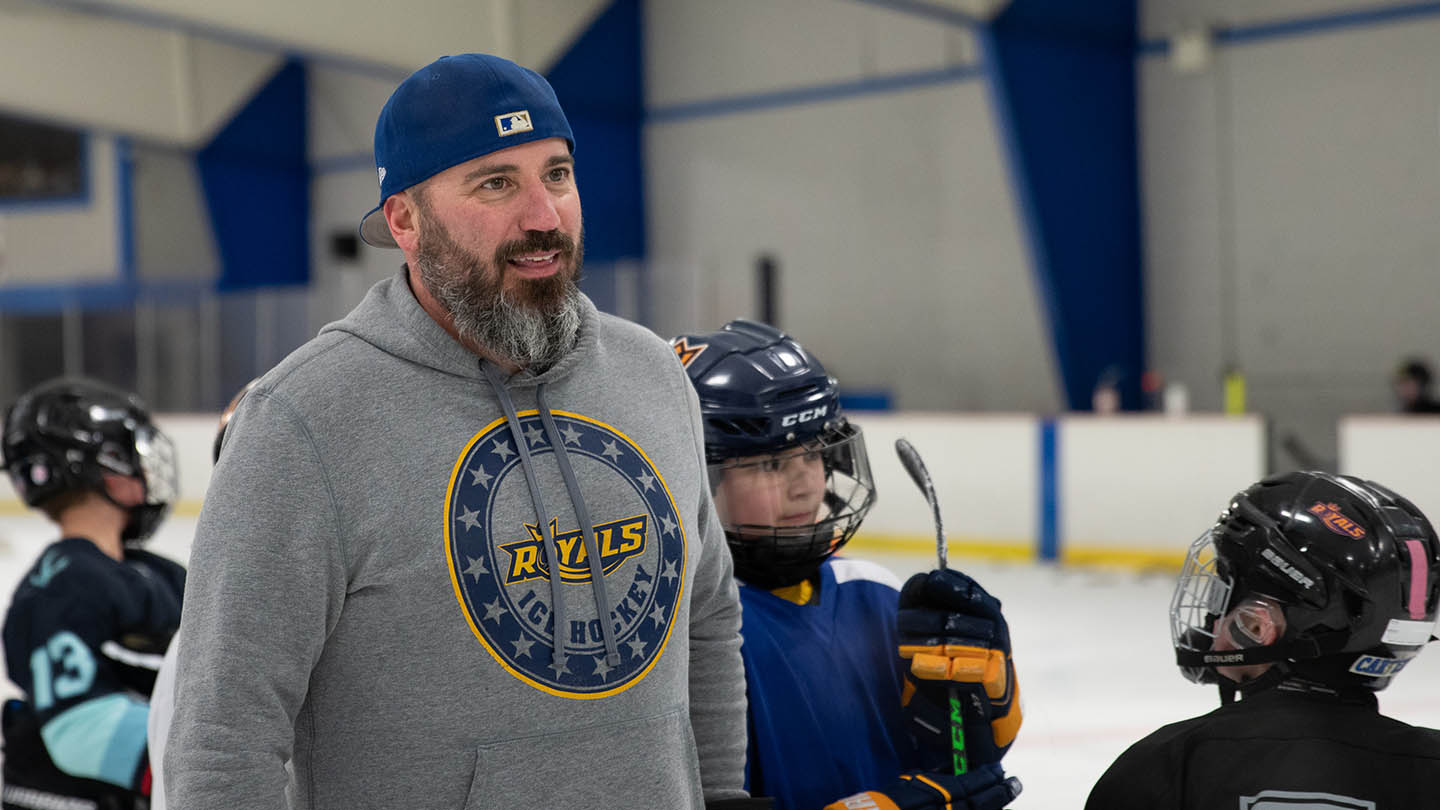In the fifth episode of The Deep End, Jon Nelson describes depression as a “no-casserole disease,” one that people are often afraid to acknowledge because of the stigma around mental health disorders. This episode lets listeners into the experience of having a disease that’s often misunderstood, and why that can be so harmful for people who struggle with depression. There’s a philosophical angle here, too: Where does a person’s self come from? And how does the brain fit into that answer?
TRANSCRIPT
Laura Sanders: This episode deals with mental illness, depression, and suicide. Please listen with care. Previously on The Deep End.
Shannon O’Neill: And DBS is not going to give you happiness. It’s not going to just be a device that turns on happiness 24/7. It’s to get you out of the hole and be on solid ground.
Jon Nelson: So has the device made me happy? The device has made me disease-free. That’s all that I needed it to do. It has not taken away the typical emotions in life that I’m going to have forever, and those are happiness, sadness, anger. I’m gonna have those and I’m going to have to learn how to live with having those.
Sanders: On the last episode, we heard how Jon had to make room for new emotions once his depression had lifted. On this episode, we’re going to talk not so much about depression, but about shame, the shame and the judgment of having a mental disorder, and all too often, the shame and the judgment of the treatment people seek. We’ll explore whether there’s something different about changing our brains versus any other part of our bodies. This is The Deep End. I’m Laura Sanders.
Like many who have struggled with a mental illness, Emily Hollenbeck has plenty of stories of people not quite getting it. She told me about some of these encounters, and one was particularly bad. It was when she was going in for ECT. That’s electroconvulsive therapy, and it’s when doctors send big doses of electricity into the brain to cause a controlled seizure. She was about to be anesthetized and her usual anesthesiologist wasn’t around that day.
Emily: One day this new guy came in and I’m laying on the table, like, it’s a very easy procedure. I really look forward to the, you know, the anesthesiologist doing his job, cause then I can just take my nap, you know, wake up later and have my little snack. But he was prepping everything, and he looks at me and goes, “Oh, you have a Ph.D. in psychology.” I was like “Yeah, like, I don’t know where this is going. It’s 8 a.m. Let’s go. Let’s get this done.” And he just like, his eyes just settled on me goes, “Huh, that’s ironic.”
Sanders: Oh my God.
Emily: And there was this palpable silence in the room, and I just sort of felt like, no one said anything, and I think it’s probably one of those moments where everyone was just kind of shocked, like, what are you talking about? Like, why would you say that? But I’m thinking like this guy is an anesthesiologist, like, of all the professionals, he should know. And of course in that moment with stigma, I mean, the problem is you’re always feeling like you’re the one who can’t say anything. So what really sticks out about that to me is with ECT oftentimes, you know, your memory is a little blurry. It’s a little fuzzy. I remember that moment. It pops up, you know, every now and then and it still, like, hits me in the chest, like, if this doctor at this really renowned hospital is saying this to me, what are other people thinking?
Sanders: So there she was, utterly vulnerable and in the hands of a doctor who clearly didn’t understand her disease at all. And who was about to give her drugs to make her unconscious.
Emily: And I think about, you know, like for the procedure, like, oftentimes they use, you know, they have to use the heavy-hitting anesthesia because they need to knock you out. And I wanted to say something. I remember I’m just literally biting my tongue and being like, “We’re not gonna sass the guy who’s injecting the propofol.”
Sanders: Feeling diminished, judged, and not understood is unfortunately something that happens a lot to people with depression, and other mental illnesses too. The shame this causes can lead people to hide their struggles.
Jon: The stigma keeps people silent. And the silence and you staying in your own head and you not being able to express how you feel just gets worse and worse and worse. And the entire goal, like I said, is to, to, is to have you take your own life. And the more you stay silent, the bigger opportunity you have to do that. And I despise it. And I despise the fact that it exists. It is real. The amount of times that I have had people say to me, “Snap out of it. What do you, dude, you got, you got a great life. You’re succeeding professionally, you got great kids, your wife’s awesome. Like, what, what do you have to be depressed about? What do you have to be depressed for?”
Sanders: Jon has ways of explaining it that really hit home. He calls depression a no-casserole disease. Cancer? People bring a casserole to your house. Broke a leg? Had a baby? Casserole. Depression? No casserole.
Jon: Cancer is horrific. It’s horrible. It’s awful. Nobody deserves it. Nobody wants it. But if you pass from cancer, you’re a warrior. You gave it all you got. People are bringing casseroles over to your house. Five-K races are going in your name, right?
Sanders: But with depression it’s different.
Jon: You tell people that you have it, and people will look at you and not say anything. Can you imagine telling somebody you have cancer, and them looking at you not saying anything, right? Awkward. Weird. If you take that exact same situation for severe mental illness, your entire mind’s getting wrecked. You’re doing it mostly in silence. People aren’t, aren’t really involved in helping out because of that. If you, if you are open about it, there’s judgment from it. And then if you pass, you take your own life, so your own life, so right there you’re stigmatized. You’re stigmatized because of the word suicide. You certainly aren’t getting life insurance. You have the, the family, “Can you believe that their dad took their life, right?” That’s what the disease is. The disease laughs at you even after death.
Sanders: Jon remembers a friend, a good friend, who finally got it.
Jon: With most diseases, Parkinson’s, cancer, you don’t have to understand what they are. You just know it sucks, right? Like, that sucks you have that, right? For some reason, people need to understand what depression is for them to get it and for them to care about it. But I had a huge insight after surgery. A week later, a friend came over. He’s been very helpful throughout all this, you know, we’d meet and walk when I could. We, you know, he was very, you know, he’d send me the text and be supportive. And he said, “How was it?” I said, “You have no idea.” I was like, “Dude, I can do normal things now.” I can, you know, which most people wouldn’t understand that being able to return your phone call is massive. Being able to walk outside? Massive. And so I’m sitting there telling him, it’s a week later, I’m like, “Man, I haven’t had a suicidal thought in a week.” And he looked at me, and he was like, “You’ve had a suicidal thought before?” And it was such, like, a mind-opening experience for me, where I’m like, this is an empathetic, kind, caring person, and they have no idea the hell that you go through.
Sanders: Patient 001 also struggles to get the experience across to people.
Patient 001: I’ve always explained to people, people don’t understand. Depression is not a character flaw. And what I mean by that is anytime you see people kill themselves, people that haven’t gone through depression, they’re like, “Oh, they give up.” People don’t give up. They’re in a fire. They’re in a fire and it doesn’t stop. And not only that, not only are they in a fire and it doesn’t stop, it’s almost like you’re possessed by a demon, like your brain, what it’s feeding you is wrong. It’s just telling you, “Kill yourself. Kill yourself every day, every day, every second.”
Sanders: There is so much about depression that people who haven’t had it don’t understand, can’t understand. But to really pile on, there are even more misconceptions about treatment for depression. Emily remembers telling someone about her upcoming ECT treatments.
Emily: I remember I was at a party, and I was telling a friend of a friend, you know, ‘Oh, I’m gonna have, start ECT next week.” And she goes, “How could you do that to yourself?” It’s like, if you saw the procedure, it’s one of those boring things. Like, it lasts like 10 minutes and you don’t feel anything. But, you know, this woman felt the need to like correct me about my, you know, medical choice.
Sanders: The real-world fallout from all those snap judgments are why I’m not identifying patient 001 by his name. He works in an intensely intellectual and competitive field, and with a new baby at home, he can’t risk losing business over people’s mistaken assumptions. He remembers telling his family he had decided to volunteer for the DBS experiment. They were skeptical at first.
Patient 001: When you go to your mom and you explain, “Mom, this is what I’m considering.” And she’s like, “Are you insane? You’re going to be a guinea pig basically? You’re going to have brain surgery?” It sounds like a bad sci-fi movie, right? At first, they were like, “What are you doing? This is so desperate. There’s so many other things, you get yada yada yada yada yada.” And then it’s like, “Oh, you’re back. You were right.” You know what I mean? Yeah, so I was like, I’m telling you. So that’s why I didn’t go to my family to sort of get their approval. I went to people that had gone through what I was going through, and it’s not because your family’s bad. Again, that’s perspective, it’s perspective.
Sanders: Don’t get me wrong. Patient 001 adores his family, but that doesn’t mean they fully understood. In a way, their reaction tracks with the bad reputations of other treatments for depression, and mental disorders more generally. Since their rise to prominence in the 1990s, antidepressants have been vilified by critics. Some people say these drugs can steal emotions and change personalities. ECT’s reputation is still suffering from the damage done by movies like One Flew Over the Cuckoo’s Nest. And even talk therapy can bring shame and secrecy, though much less so today than in the past. So perhaps it’s not surprising that the idea of electrodes implanted in the brain raises a whole new set of assumptions, of misgivings and judgments. But this made me wonder, “Why?” What’s the difference between antidepressants, for instance, and DBS? Is there one? Emily has thought about this distinction a lot.
Emily: I think if you talk to someone in this day and age, this would be my guess, and you said, oh, I’m taking Prozac and I’m, I’m scared it’s going to change the core of me. Then we would be like, why? And thinking about that argument with DBS, I could see why that would be potentially like more interesting to someone, or potentially more plausible, but biochemically, if you look at what’s happening, and you say, “Oh, you know, Prozac is changing me or DBS is changing me,” what does that even really mean?
People are much more concerned about modifications to brain-based, you know, like brain tissue or brain activity than they would be to the kidney. And obviously that makes sense, because a lot of what we experience comes through our brains, but is that really where our self is? And why are people so sensitive about the self, especially when coming to thinking about invasive treatments versus something like Prozac?
Sanders: I’ve been wondering the same thing. What sets the brain apart? And why are people so uncomfortable with attempts to change it? It’s a part of our body, just like the lungs and the heart and the kidneys, like Emily says. So why do we get squeamish when it comes to our brains?
In my reporting, I came across some examples of surprising side effects from DBS. One interesting case study sticks with me, and it highlights how the science here is very far from clear. A Dutch man was being treated for obsessive-compulsive disorder. When his stimulation was on, he developed a brand new and intense love of Johnny Cash hits. Especially Ring of Fire, Folsom Prison Blues, and Sunday Morning Coming Down. Before DBS, his favorites were Dutch language songs and classics by the Beatles and The Rolling Stones. But when his DBS was on, it was the Man in Black all the way. When his stimulation diminished or when his batteries ran down, the man subconsciously switched back to listening to his old favorites. The anecdote might sound a little bit trivial. This guy’s new musical taste didn’t bother him. It’s a very minor thing in the grand scheme of things, but that change, that switch, arguably bores straight to the core of our unease.
So many of us consider our brains, and the minds they create, the bedrock of our identity. After all, it’s where our memories live, our thinking, our personality, our worries, our taste in music. So when a disease attacks the brain or a treatment changes the brain, we get nervous. None of us likes the thought of having a brain implant tell us what music we like, especially if we’re not even aware of it. The stakes are much, much higher when it comes to how we feel, to our emotions.
Reporting this story, I actually heard a lot of jokes about being a cyborg, being Bluetooth enabled, bionic. People would kind of laugh as they said it, but is there anything more to these offhand comments? Does the brain implant change who you are in some fundamental way? Here’s what Jon thinks.
Jon: I can only tell you that it is, it is the exact opposite of that question. It purely eliminates the disease. It purely eliminates the factors and the issues that come about with the disease. That’s it. It does not, you know, sci-fi wise and movies and skits and all these shows we’ve seen, you know, it does nothing about that. And, you know, I’ve had, what’s the word? People have said before, like, “You’re the bionic man,” like friends of mine, right? They’ve said that and you just, yeah, yeah, totally dude.
Sanders: Amanda echoes that sentiment.
Amanda: Like I don’t feel like it’s, nothing I’ve done has ever changed my who I am or my personality. I’m still the same person, just like, suffering more or less. I feel like it lets me be me more, cause I’m not fighting with myself to be alive.
Sanders: Emily says that who she is, is a choice. Her depression is the thing that took that choice away.
Emily: It really altered who I was and of course it’s like this insidious progress. It’s not just, one day you have depression full blown. But I look back and I think about moments of like, you know, one particular disaster, disastrous meeting with the committee, and I want to go back and hug myself, and I’m almost upset like that I berated myself so much. But at that moment, that’s what my brain was predisposed to. In that moment, in those times, what really felt salient was, “I am uniquely and horribly bad. Something is uniquely, horribly wrong with me.” And now I don’t have that feeling. So which of those is correct? I don’t know, but I know which one I like better, like. So I, I don’t know, it’s not a satisfactory answer for your question, but I think what really gets to the heart of it is, I feel like I’m untethered, and I have an ability now to focus on the things that I really do care about, and that’s where my self lies.
Sanders: Shannon O’Neill, the psychologist who has worked with Jon and others, has a way to help people think about their identity, about their self, as they learn to live with DBS.
O’Neill: Do, I do have some thoughts of that, of, of identifying who the self is outside of depression. And I think that those are, those are next steps that we transition to when they have that abstract flexible thinking. One exercise I do is, it’s called the admirable person exercise. And it says, think about the individual that you absolutely admire in your life, not for fame, wealth, beauty, money, but who they are, as a person. And it can be anyone you want. And usually that person they identify, and the reasons why, really gets to their core values of what they appreciate and what they want to live by with meaning and purpose. And we try to move towards that of how can we have committed action in that version of yourself going forward.
Sanders: This way of defining yourself strikes me as particularly meaningful. This is purposeful. This is intentional. It’s defining yourself in the way that you choose. These days, Jon says, his self is lighter. Without the poison coursing through his body, Jon feels better, more energized, more present in his life. But as his daily surveys make very clear, he’s still a little bit crabby.
Jon: So poison was way over here, was 9 out of 10, right, before the disease. After the disease it’s at 0. I rate mental force field. So what mental force field is, is, “Why can’t I walk the dog, right? Like why can’t I do this?” Like, that was at 9 out of 10, 10 out of 10. That’s now out of 1 out of 10, right? I’m still a dude, I still have hard times doing certain things, but like, you know, going from a 10 out of 10 to 1 out of 10 is incredible. And then the one that’s pretty much remained consistent is irritability. And so irritability for me was at like a 6 or a 7 or an 8. Guess what? It’s still at a 6 or a 7 or an 8. And so, like my perspective to them on that is, it’s not that the surgery didn’t work. I guess I’m just like a cranky middle-aged dude now, right? Like that just is what it is.
Sanders: Barbara is one of best judges of who Jon is now. Is he someone new with DBS?
Barbara: I, like, yeah, like you can’t say his old self, there’s, he never, like, wasn’t himself through this whole process. It’s always, it’s just, he is more comfortable and happy and relaxed and productive and present and engaged. So the things that the disease was trying to steal from him, he’s getting back.
Sanders: So, no, Jon with a brain implant is not a new bionic Jon. He’s just Jon. On the next and final episode, we’re going to look to the future for Jon and to the future for DBS.
Mayberg: This is never where I expected to be. But you’re here, so step up. Why wouldn’t you step up? This is the experiment of a lifetime, you know? Even if you, if right this second after this call, I had to stop, I wouldn’t trade it for one second. But I’d sure like to see the last inning. And we’re all in. I’m all in.
Sanders: We’re considering a bonus episode that addresses your question, comments and thoughts. Please send them to us at podcasts@sciencenews.org. If you or someone you know is facing a suicidal crisis or emotional distress, call or text the 988 Suicide and Crisis Lifeline at 988. This is the Deep End. I’m Laura Sanders. If you liked this podcast, tell your friends or leave us a review. It helps the show a lot. Send us your questions and comments at podcasts@sciencenews.org. The Deep End is a production of Science News. It’s based on original reporting by me, Laura Sanders. This episode was produced by Helen Thompson and mixed by Ella Rowen. Our project manager is Ashley Yeager. Nancy Shute is our editor in chief. Our music is by Blue Dot Sessions. The podcast is made possible in part by the Alfred P. Sloan Foundation, the John S. James L. Knight Foundation, and the Burroughs Wellcome Fund, with support from PRX.
Episode credits
Host, reporter and writer: Laura Sanders
Producer: Helen Thompson
Mixer: Ella Rowen
Sound design: Ella Rowen and Helen Thompson
Project manager: Ashley Yeager
Show art: Neil Webb
Music: Blue Dot Sessions, Epidemic Sound
Sound effects: Epidemic Sound, Mayfield Brain & Spine
Additional audio: Luke Groskin
Voice of Patient 001: Nikk Ogasa










